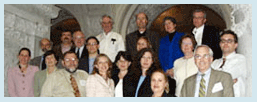I just found my way today to Copysense (obviously I don’t have enough feeds to read as it is!). Their current clippings post highlighted part of the following quote as their Quote of the Week.
 “[L]egislative changes to the copyright law are needed. First, we need to amend the law to give the Library of Congress additional flexibility to acquire the digital version of a work that best meets the Library’s future needs, even if that edition has not been made available to the public. Second, section 108 of the law, which provides limited exceptions for libraries and archives, does not adequately address many of the issues unique to digital media—not from the perspective of copyright owners; not from the perspective of libraries and archives.” Marybeth Peters , Register of Copyrights, March 20, 2007
“[L]egislative changes to the copyright law are needed. First, we need to amend the law to give the Library of Congress additional flexibility to acquire the digital version of a work that best meets the Library’s future needs, even if that edition has not been made available to the public. Second, section 108 of the law, which provides limited exceptions for libraries and archives, does not adequately address many of the issues unique to digital media—not from the perspective of copyright owners; not from the perspective of libraries and archives.” Marybeth Peters , Register of Copyrights, March 20, 2007
Marybeth Peters was speaking to the Subcommittee on Legislative Branch of the Committee on Appropriations about the Future of Digital Libraries.
Copysense makes some great points about the quote:
Two things strike us as interesting about Ms. Peters’ quote. First, she makes the quote while The Section 108 Study Group continues to work through some very thorny issues related to the statutes application in the digital age […] Second, while Peters’ quote articulates what most information professionals involved in copyright think is obvious, her comments suggest that only recently is she acknowledging the effect of copyright law on this nation’s de facto national library. […] [S]omehow it seems that Ms. Peters is just now beginning to realize that as the Library of Congress gets involved in the digitization and digital work so many other libraries already are involved in, that august institution also may be hamstrung by copyright.
I did my best to read through Section 108 of the Copyright Law – subtitled “Limitations on exclusive rights: Reproduction by libraries and archives”. I found it hard to get my head around … definitely stiff going. There are 9 different subsections (‘a’ through ‘i’) each with there own numbered exceptions or requirements. Anxious to get a grasp on what this all really means – I found LLRX.com and their Library Digitization Projects and Copyright page. This definitely was an easier read and helped me get further in my understanding of the current rules.
Next I explored the website for the Section 108 Study Group that is hard at work figuring out what a good new version of Section 108 would look like. I particularly like the overview on the About page. They have a 32 page document titled Overview of the Libraries and Archives Exception in the Copyright Act: Background, History, and Meaning for those of you who want the full 9 years on what has gotten us to where we are today with Section 108.
For a taste of current opinions – go to the Public Comments page which provides links to all the written responses submitted to the Notice of public roundtable with request for comments. There are clear representatives from many sides of the issue. I spotted responses from SAA, ALA and ARL as well as from MPAA, AAP and RIAA. All told there are 35 responses (and no, I didn’t read them all). I was more interested in all the different groups and individuals that took the time to write and send comments (and a lot of time at that – considering the complicated nature of the original request for comments and the length of the comments themselves). I was also intrigued to see the wide array of job titles of the authors. These are leaders and policy makers (and their lawyers) making sure their organizations’ opinions are included in this discussion.
Next stop – the Public Roundtables page with it’s links to transcripts from the roundtables – including the most recent one held January 31, 2007. Thanks to the magic of Victoria’s Transcription Services, the full transcripts of the roundtables are online. No, I haven’t read all of these either. I did skim through a bit of it to get a taste of the discussions – and there is some great stuff here. Lots of people who really care about the issues carefully and respectfully exploring the nitty-gritty details to try and reach good compromises. This is definitely on my ‘bookmark to read later’ list.
Karen Coyle has a nice post over on Coyle’s InFormation that includes all sorts of excerpts from the transcripts. It gives you a good flavor of what some of these conversations are like – so many people in the same room with such different frames of reference.
This is not easy stuff. There is no simple answer. It will be interesting to see what shape the next version of Section 108 takes with so many people with very different priorities pulling in so many directions.
 The good news is that there are people with the patience and dedication to carefully gather feedback, hold roundtables and create recommendations. Hurrah for the hard working members of the Section 108 Study Group – all 19 of them!
The good news is that there are people with the patience and dedication to carefully gather feedback, hold roundtables and create recommendations. Hurrah for the hard working members of the Section 108 Study Group – all 19 of them!
I have what I think is a simple question & don’t know where to turn for an answer: I have a CD of misc. spoken word essays (from people like Andy Rooney, Ben Stein, etc.) dubbed from TV onto audio disc. Do I have the right to disseminate copies of my disc without asking for each reader/author’s permission? The catch is that I would like to charge a nominal shipping & handling fee of, say, $3 per disc. There is no attempt being made to profit from the sale of work which is clearly not my own. I’d appreciate any advice you can give…
RG,
I am not an expert on these things – and the ideas I do understand are mostly related to archiving and preservation. That said – I found a few resources online that might point you in the right direction.
Rules and Permissions for Audio-visual Media Copyright law and audio-visual materials
How much of someone else’s work can I use without getting permission?
Building a National Strategy for Preservation: Issues in Digital Media Archiving
Hope they help!
Jeanne